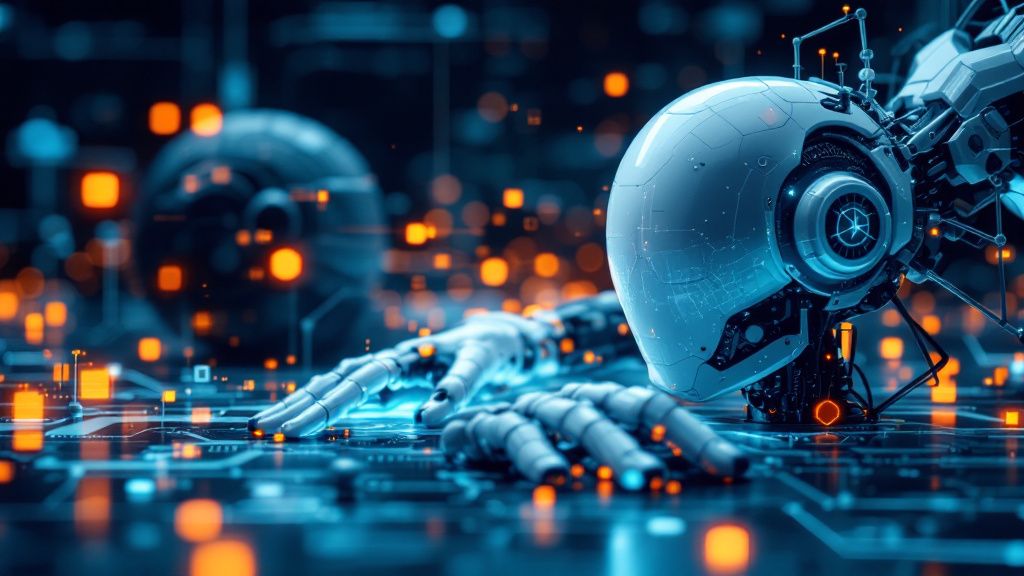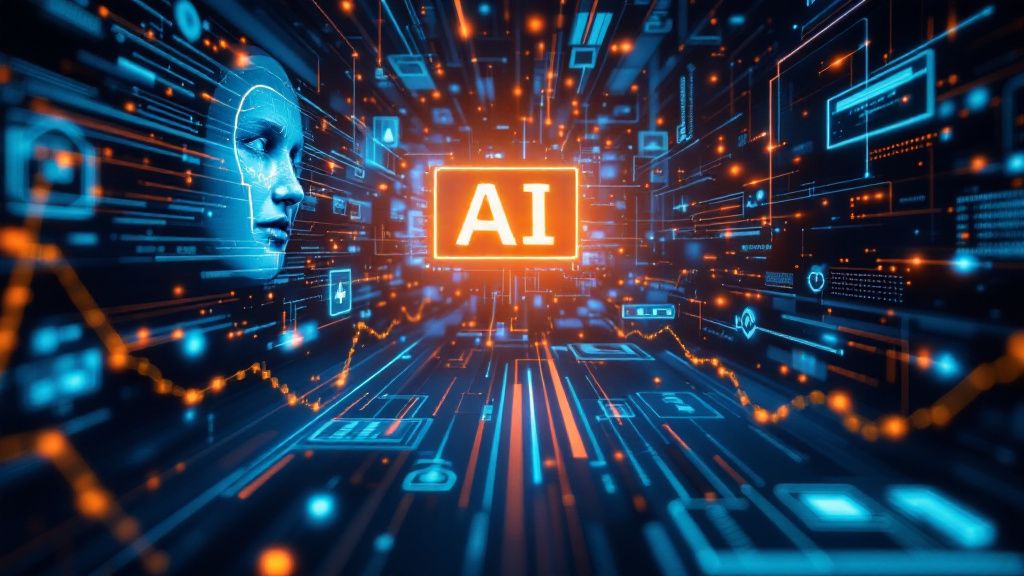Artificial intelligence is a transformative force reshaping the landscape of everyday life, permeating numerous aspects of your world. Within the home, AI assists in managing and anticipating your daily needs with remarkable accuracy and convenience. As you navigate modern transportation, AI plays a crucial role in developing autonomous vehicles that promise safer and more efficient travel. In healthcare, AI enhances diagnostic tools, enabling doctors to offer personalized treatment plans tailored to your unique circumstances. Businesses leverage AI to streamline operations, achieve greater efficiencies, and position themselves at the forefront of innovation. This implementation of AI in business highlights its vital role in maintaining competitiveness and advancing organizational goals. The future of artificial intelligence is poised to further revolutionize industries, ushering in an era of unprecedented technological growth. As you engage with these AI-driven solutions, it becomes evident that they are not merely futuristic concepts but key components of modern life, driving innovation and fostering opportunities across diverse fields.

The Evolution of Artificial Intelligence
The history of artificial intelligence traces back to the mid-20th century, when pioneers like Alan Turing laid the groundwork for modern computational thinking. Early AI research focused on logic-based systems and the development of machine learning algorithms, which have evolved significantly over the decades. Today, AI encompasses a wide range of technologies such as neural networks, natural language processing, and computer vision, shaping how machines interpret and respond to vast data sets.
The current state of artificial intelligence reveals a rapidly growing field characterized by advancements in deep learning and autonomous systems. These trends highlight AI's expanding capabilities, making it an indispensable tool in various domains. You witness AI's influence in sectors like finance, where algorithms predict market trends, and healthcare, where precision medicine becomes more attainable. As AI continues to mature, its applications diversify, promising further breakthroughs across many industries.
As you explore the future of artificial intelligence, you observe a trajectory towards even greater integration into daily life and business operations. Implementing AI in business processes is becoming more prevalent as organizations strive for agility and innovation. This progression underscores AI's potential to drive economic growth and transform industries, suggesting a future where AI plays an integral role in shaping both technological advancements and societal developments.

Artificial Intelligence in Healthcare
Artificial intelligence is revolutionizing healthcare by enhancing diagnostic accuracy and enabling personalized medicine. In radiology, AI systems assist in analyzing medical images with precision and speed, helping doctors detect anomalies that may be difficult to spot. This technology augments clinical decision-making, allowing healthcare professionals to develop treatment plans tailored to individual patients, ultimately improving outcomes and efficiency.
AI's role extends to drug discovery, where it accelerates the identification of potential treatments by analyzing massive datasets to predict molecular interactions. This advancement reduces the time and cost associated with bringing new drugs to market, offering hope for addressing complex diseases more effectively. By shortening development cycles, AI fosters innovation within the pharmaceutical industry.
While many worry about AI replacing human expertise in healthcare, there's a compelling argument for AI as a powerful augmentation tool. It enhances, rather than replaces, human capabilities by freeing healthcare professionals from routine tasks and enabling them to focus on patient-centered care. This collaboration between AI and healthcare practitioners drives significant progress in medical research and patient outcomes, reflecting the future of artificial intelligence in this vital field.

AI in the Automotive Industry
The automotive industry is experiencing a significant transformation driven by artificial intelligence, which is introducing profound changes in vehicle design, manufacturing, and operation. AI technology is at the core of developing autonomous vehicles, equipping them with the ability to navigate roads, detect obstacles, and make decisions, enhancing safety and efficiency in transportation. As a result, self-driving cars are moving from experimental stages to practical applications.
AI is also optimizing manufacturing processes in the automotive sector, using predictive analytics to anticipate maintenance needs and streamline production lines. Implementing AI in business operations within this industry enhances quality control, reduces waste, and increases efficiency. These intelligent systems enable manufacturers to innovate and adapt quickly to market demands, ensuring competitiveness and growth.
In vehicle management, AI is being used to develop advanced driver assistance systems (ADAS). These systems assist with tasks such as lane-keeping, adaptive cruise control, and collision avoidance, significantly improving driver safety and experience. The integration of AI is creating smarter vehicles that communicate with their environment and each other, promising a future of connected, efficient transport systems.
One unpopular opinion about AI in the automotive industry is that its extensive use could diminish traditional driving skills. Some argue that reliance on AI-driven systems might lead to a population less capable of manual driving. This perspective suggests that while AI enhances safety, it could inadvertently erode the skill set that has been fundamental to human mobility for decades, prompting a need for balance in the approach to automation.
Looking ahead, the future of artificial intelligence in the automotive sector is bright, with the potential to redefine transportation entirely. The ongoing innovations promise reduced emissions, improved traffic management, and increased accessibility. As you witness these shifts, it becomes clear that AI isn't just reshaping vehicles; it's transforming the entire landscape of mobility.

Artificial Intelligence in Business
Artificial intelligence is significantly reshaping the business landscape, enhancing efficiency and innovation across various sectors. Companies are leveraging AI for business to optimize processes, improve customer experiences, and make data-driven decisions. In marketing, AI analyzes consumer behavior to deliver personalized content, increasing engagement and conversion rates. In operations, AI-driven automation streamlines repetitive tasks, allowing human workers to focus on strategic activities and foster creativity.
One of the challenges in implementing AI in business is ensuring data privacy and security. With AI systems handling enormous volumes of sensitive information, the risk of data breaches and non-compliance with regulations becomes a pressing concern. This issue can be addressed through robust cybersecurity measures and stringent data governance policies, ensuring that AI systems protect user privacy while enhancing operational capabilities. Addressing these challenges is vital to fostering trust and enabling sustainable growth in the future of artificial intelligence within the business ecosystem. As businesses continue to integrate AI, you witness its transformative power, enabling enterprises to adapt swiftly to changes and seize new opportunities.

AI in Education: Transforming Learning Experiences
Artificial intelligence is revolutionizing education by personalizing learning experiences and enhancing accessibility. AI-driven platforms analyze student performance and adaptively offer customized learning pathways that cater to individual strengths and weaknesses. This personalized approach empowers students to learn at their own pace, ensuring that each learner receives the attention and resources needed to thrive.
Imagine AI in education as a skilled tailor, crafting a bespoke suit for each student. Just as a tailor measures and adjusts to fit each individual perfectly, AI systems evaluate learners' unique needs and adjust educational content accordingly. This tailored approach transforms education into an engaging, personalized journey, fostering deeper understanding and retention.
AI also supports teachers by automating administrative tasks such as grading and attendance tracking, freeing educators to focus on instructional strategies and student interaction. This integration of AI into the classroom promotes a more efficient teaching environment, enriching the overall educational experience for both teachers and students.
In the broader scope, the future of artificial intelligence in education encompasses creating inclusive environments where diverse learning styles are accommodated. As AI continues to evolve, it promises greater opportunities for collaboration, creativity, and critical thinking, equipping students with the skills needed for the dynamic, AI-driven future.

Ethical Considerations of AI Technology
Artificial intelligence technology presents complex ethical considerations as its role in society expands. The rapid development of AI brings concerns about privacy, bias, and accountability. Ensuring data privacy is crucial as AI systems process large volumes of information, making data protection a paramount issue. AI's dependence on data also raises concerns about impartiality, given that biased data can lead to unfair outcomes in decision-making processes.
On one hand, AI advocates see these technologies as tools for social good, offering solutions to complex challenges like personalized healthcare and improved business efficiencies. However, critics worry about AI exacerbating existing inequalities by reinforcing biases present in the data it learns from. This contrasting perspective highlights the need for transparency in AI systems to mitigate potential harm and promote fairness.
The future of artificial intelligence hinges on ethical development practices that prioritize accountability. Responsible AI involves ensuring that systems are designed and deployed in ways that are transparent and equitable. By addressing these ethical concerns, you can help shape an AI ecosystem that aligns with societal values, promoting trust and acceptance. As AI continues to evolve, maintaining an ethical framework is essential to harness its potential while safeguarding human rights.


.jpg)

.jpg)
.webp)
.webp)
.webp)


.svg)









